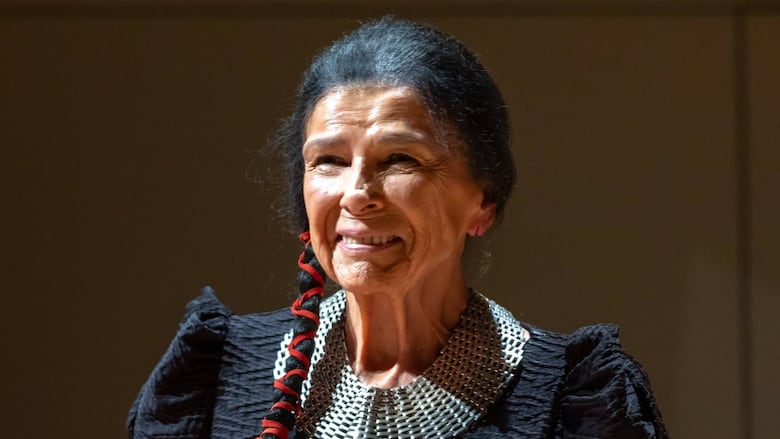Indigenous filmmaker Alanis Obomsawin on the quiet power of listening
'Your life is sacred. You must change the perspective from limitations to all is possible,' says Obomsawin


*Originally published on November 7, 2023.
At the age of 92, prolific Abenaki artist and filmmaker Alanis Obomsawin is not slowing down.
For nearly 70 years, her storytelling and documentary work has served as a mirror for Canada, vividly capturing and reflecting Indigenous experiences, providing a space for all Canadians to witness perspectives that have otherwise been suppressed and ignored.
Obomsawin talks about her life's influences and the quiet power of listening in her 2023 Beatty Lecture at McGill University.
"I continue making documentaries. In those days, everything was so full of pain and danger. It was hard for our people to imagine change," she told an audience at Pollack Hall on McGill's downtown campus.
"My dear brothers and sisters, we are all born with a gift. And to each one of you. Your life is sacred. You must change the perspective from limitations to all is possible. Slowly change came and our people realized their ability to become whatever they wish or what they wanted to be.
"Many years pass. I am now 91 years old. A few years ago, I told myself. Everything has a reason. The fact that I went through so much trouble, I did not want other children to experience these feelings. So I worked hard to make sure that no other children would be treated like that."
Making documentaries was a way to provide a space for Indigenous experiences that would otherwise go unseen and unheard, nurturing better Indigenous and settler relations. All 60 of her NFB films are available to stream through the National Film Board of Canada.
After her Beatty Lecture, the legendary documentary filmmaker and artist spoke to IDEAS host Nahlah Ayed.
Here is an excerpt of their conversation:
N: I want to begin with words that you've used to describe your own filmmaking. You've described your films as 'a mirror for this country.' You have now been holding that mirror for more than half a century.
A: That makes me an old lady!
[Laughter]
I was really struck by what you said that you see this as a moment when all is possible. Can you speak a bit more about you know, you've seen a lot of change in the relationship between the Indigenous people of this country and the settlers on this land?
I think that it didn't happen overnight. It's been very bad for many generations. And part of that is why I'm still here, because I really believe what is possible. But the extraordinary thing, like let's say even 10 years ago, I could not have talked the way I do now.
For instance, if you're in conversation with anybody from anywhere, if you mentioned the word treaty, the reaction I know with me was all, 'Oh, that doesn't even exist anymore. No, there's no treaty.' And it really annoyed me. Something awful. But I made a film called Trick or Treaty. That tells you a lot. And since then, it is very much used at all levels, the university level, colleges everywhere. And it's very different here. Now everywhere I go, I can tell you people are listening to me and I feel the respect.
What's changed?
I think the educational system has changed. For many generations, the books that were used in places were called The History of Canada, written by the brothers of the Catholic Church, which was pretty ugly, full of lies and designed to create hate towards our people. I was getting beat up all the time as a child. When I figured it out, I thought if the children could hear a different story, they wouldn't be like that. They're not born racists. And that's when I started singing and it took quite a while to get to that point. But telling stories to children. I've done hundreds of schools over the years, and I still do whenever I can.
Yes, there are lots of changes and people are less afraid to fight back. I can say that now I can see Canada is at the front for a lot of things concerning education. So then this is a big change. And I don't want anybody who is making the changes to get discouraged. I want to praise them because I see the difference. And I think I'm lucky to have lived this long to see the difference. It's wonderful.
Not at all to take away from what you've just said and the positivity of that. But when you look forward, what still needs to change?
Well, I'm not saying that everything is for sure, but there's a lot of good things happening and there's a lot of possibility to force changes. And making documentaries for me is the best tool.
But what do you look forward to as evidence of a genuine attempt at truth and reconciliation in Canada?
Well, you're not going to believe me, but it's happening. I don't know what exactly it will come to. And I never thought that, for instance, I could be part of a group with the government that we criticize and you know, they're listening. We have some of our own people who are working there [in government]. There are the possibilities and the strength is there. I'm not saying it's going to happen tomorrow, but we work on it.

Download the IDEAS podcast to listen to this episode.
*Q&A is edited for clarity and length. This episode was produced by Nicola Luksic.
